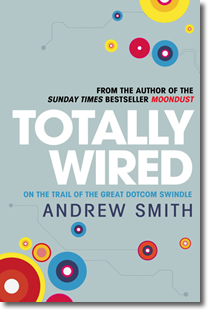Totally Wired: Book review

Totally Wired could easily have been retitled Totally Weird. When I first flicked through the book, the bizarre and salacious details had me checking that Josh Harris was a real person rather than some picaresque satire on dotcom excess. He's not the character you might expect to stand for the internet boom and bust of the 90s — he wasn't part of Netscape or Google, or even in Silicon Valley. Pseudo.com was a web media portal in New York's advertising-industry dominated Silicon Alley, and Harris went from trying to combine the web and reality TV to an online nervous breakdown, retreating first to an apple farm in upstate New York and then Ethiopia. This is where the travelogue starts — on a dusty, potholed road near the Somali border where the author finds the romance and brio he recounts in the hard-partying New York of the 90s and finds so sadly lacking in today's geeky Silicon Valley.

The mixture of paranoia and rewriting of history — especially questions like whether Harris did or didn't stage an art 'happening' at the pre-9/11 Twin Towers (involving a helicopter and a window replaced with a temporary balcony to dance on), and whether he was or wasn't was followed by spies when he was selling his orchard refuge — leave the reader wondering about the reliability of some of what Smith recounts in the book. Indeed, the author frequently wonders about it himself. That might be appropriate, given the blurring of the lines between life and performance in Quiet and We Live In Public, two art projects reminiscent of both Big Brother and The Truman Show that Harris ran under the Pseudo umbrella — and that ultimately caused his meltdown (along with the failure of Pseudo). If you know the camera is always on, can you avoid playing to it?
Pseudo.com was trying to tap into the urge to record our lives and show them off that has powered Facebook to success, but in a much more frenetic and voyeuristic manner. Like many pre-Facebook sites, it was about the more demanding video and webcasting rather than text and photos (a distinction that escapes the author when he repeatedly praises Pseudo.com for being years ahead of Facebook). When Harris and his girlfriend tried to live on camera for 100 days, the technology didn't always do the expected: motion sensors meant the camera might switch away from someone in the shower because a cat walked in front of a camera, leaving viewers staring at an an empty room…
With an apartment — and a bathroom — wired for broadcasting, Harris called himself "the good side of Big Brother" and planned to "take CBS out of business". Instead, Pseudo.com was the first Silicon Alley company to go bust. Ahead of his time, a fantastic showman dazzling the gullible, a social manipulator with strangely poor social skills or narcissist headed for self-destruction? It's hard to tell, and sometimes hard to care. Although Harris describes his own story as "this is all hearsay but fairly reliable", it sounds by turns shallow, predictable, bizarre, confusing and deeply sad. It seems to have sucked the author into the kind of long, strange trip more usually associated with the counterculture pranksters who show up in the history of Silicon Valley companies — complete with a drug-fuelled Grand Narrative that may or may not turn out to be true in the final chapter.
"Pseudo.com was trying to tap into the urge to record our lives and show them off that has powered Facebook to success, but in a much more frenetic and voyeuristic manner."
New York in the 90s seems just as much of a fantasy, with the ups and downs of the online world and the dotcom boom and bust, including a detour into the financial markets that Smith returns to repeatedly to punctuate descriptions of life at Pseudo. In between there are digressions into the early history of the internet: what it's like to be on a reality TV show; what it's like to watch Josh Harris do interviews and work on documentaries about his life that air at Sundance; whether being connected so much is making us shallow or revolutionising our relationship with products and marketing; and how people who have been worth millions and then lost it all in the crash deal with that.
This is a discursive account of the dotcom boom and crash. It tries to explain why it was possible, and throws in a fairly plausible theory about the stock market manipulation that may have fuelled and then destroyed the technology IPO market in the 1990s. Woven in and out is a rambling account of Psuedo.com and Josh Harris himself, who the author finds endlessly fascinating — an epilogue, an afterword and a postscript suggests that Smith found it hard to stop telling the story. If you don't find Harris equally fascinating, at least the book is stuffed with enough anecdotes, quotes and theories to make you an instant expert on some of the forgotten foundations of the web as we know it today.
Totally Wired: On the Trail of the Great dotcom Swindle
By Andrew Smith
Simon & Schuster
ISBN-13: 9781847374493
416 pages
£19.99 (hardback), £8.99 (paperback), £9.99 (e-book)